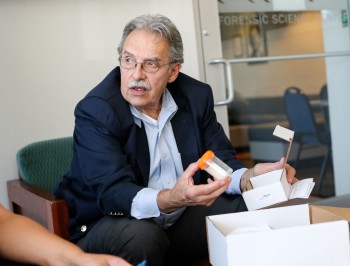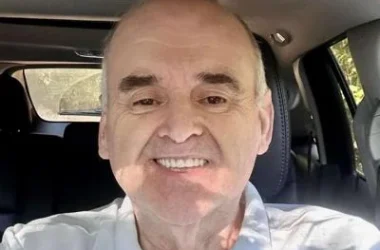
Dr. Terry Fenger, director of the Forensic Science Center, discusses the contents of a rape kit during a tour of the facility on Wednesday, Aug. 31, 2016, in Huntington.
HUNTINGTON, W.Va. — West Virginia has made some headway in doing forensic testing of sexual assault kits that have been on shelves for up to 15 years or more, but it still has a long way to go and has not made the same inroads on its backlog as some of its neighboring states.
In fact, the Mountain State doesn’t know how big a task is ahead of it, because it has yet to complete a statewide inventory of how many untested rape kits are in the hands of police agencies in most of its counties.
Nor has the state set a timetable for eliminating its backlog, and it has not figured out how to pay for the entire project and hasn’t set standards for the timely processing of rape kits in the future so that backlogs won’t occur again.
For some of the victims of those assaults that the untested rape kits represent, the lengthy delays are frustrating.
Sharon Pressman, executive director of Contact Rape Crisis Center, said the delay in testing causes great pain for the hundreds of victims, some of whom have waited 15 or more years for answers.
“It’s a very traumatic experience for the victim,” she said. “Even years later when someone comes to the victim with information regarding their case, it can bring it back to them like it was yesterday. That’s the way PTSD (post-traumatic stress disorder) works.”
At the center of West Virginia’s effort to reduce the backlog is the Marshall University Forensic Science Center. It is doing all the kit testing in a partnership with the West Virginia State Police, helping to take a load off state police labs that struggle to keep up with the demands of other types of cases from around the state.
The Forensic Science Center’s director, Dr. Terry Fenger, is aware that West Virginia trails many other states in reducing its backlog, but he details the progress made so far. He’s even encouraged that with the help of about $3 million in federal grants, the state can set a precedent for the best way for rural states to handle their backlogs and future rape kit procedures.
“West Virginia is actually aggressive in seeking out and inventorying these kits, as long as money is available,” he said. “The key is money, and the federal government is the key to money.”
Progress to date
A sexual assault kit is a white cardboard box, about the size of a shoebox, full of unused swabs, bags and paperwork. Graphic paperwork, swabs, nail clippings, blood and urine fill the box after evidence is collected from an assault victim. Bulkier items – clothing or bedding – are attached to the outside of the box.
In tackling the rape kit backlog beginning in 2013, West Virginia started with two of the state’s most populous counties, Cabell and Monongalia. So far, 558 kits dating back at least 16 years have been tested. About 60 percent of those yielded DNA.
For the next 16 counties in line for testing, it is estimated 2,000 more kits will be reported. Fenger estimated about 800 currently counted in those counties so far.
A testing timetable for the state’s remaining 37 counties has not been set. It is not known how many kits may be awaiting testing in those counties.
Believed to be the county with the largest backlog, Cabell County was at the forefront of the project. The forensic center’s lab received 315 cases from Cabell County, with 167 of those yielding DNA. Of those, 100 were able to be loaded by West Virginia State Police into the national Combined DNA Index System (CODIS), which resulted in 39 matches of DNA in other cases in the database.
A returned match to another case does not necessarily mean an assailant’s name will be known, but it does allow agencies to compare notes to find the perpetrator, Fenger said.
Fenger called Cabell County the benchmark of the program for the entire state.
The Huntington Police Department’s effort, led by Sgt. Steve Compton, has set a path for other agencies to follow from inventory, transportation to labs and follow-up with victims. Now, the department has set a high priority on 13 of the cases involving DNA matches.
The question then becomes how to contact the victims in those cases.
Two victims had been reached by August by HPD, but neither wished to press charges.
As for the others, Huntington Police Chief Joe Ciccarelli confirmed the agency will soon add a link to its website allowing victims who believe their cases were backlogged to reach out.
Monongalia County now has 243 kits tested. That resulted in 65 DNA profiles and 49 uploaded into the national system. So far, no hits have been returned.
The “hits returned” number will rise as the months go on. It’s just a matter of waiting for the assailant to slip, the Forensic Science Center’s DNA Technical Leader Jason Chute said.
“We did a project for Miami Dade in 2007 for property crimes and we just got a hit,” he said. “That’s almost 10 years ago. That number will always increase.”
Only one of the overall 558 kits tested resulted in prosecution so far.
Oswald Ryan Gibson, 51, of Ashland, Ohio, is charged locally with kidnapping and three counts of second-degree sexual assault. He is currently serving 10 years in prison in Ohio for similar charges.
Other states’ status
Unlike surrounding states, West Virginia has no mandates requiring law enforcement agencies to track or test the sexual assault kits. The state also does not have any requirement saying when tests must change hands from hospitals to law enforcement to a forensic testing agency, nor does it mandate that an inventory of untested kits even be kept.
For comparison, Kentucky and Ohio have some of the strictest laws in the country for the handling of sexual assault kits. Both have kit audits and mandated backlog testing. In Ohio, the investigating agency now has 30 days to turn the kit over to the lab.
In Ohio, as of Sept. 1, 294 law enforcement agencies had submitted 13,930 kits to be tested as part of Attorney General Mike DeWine’s Sexual Assault Kit Testing Initiative. Of those, 11,705 kits have been tested, resulting in 4,221 returns to other cases in the CODIS system.
In Cuyahoga County, the Cleveland area of Ohio, 524 defendants have been indicted as a result.
DeWine launched the initiative in 2011 after learning agencies were not sending kits for testing. DeWine asked law enforcement to send the kits for DNA testing, with no cost to them.
DeWine said he noticed the backlog as a prosecutor and decided to use Ohio’s governmental system to better utilize DNA testing, especially with the sexual assault kit backlog.
“That’s the way we work in Ohio,” he said. “The system is (the attorney general runs) the state crime lab and that crime lab is available to any police department in the state. I can make that decision. If I didn’t control the crime lab, I couldn’t make that decision. I would have no way of getting it done.”
Fenger said Ohio was a great example of where he would like West Virginia to be. He, West Virginia state Sen. Bob Plymale, D-Wayne, and others trekked to a crime lab in Ohio last year to get an understanding of how West Virginia could adapt to that system.
“We use Ohio as a benchmark because they are one of the more advanced states,” he said. “The reason Ohio is so advanced is a lot of state money was pumped into that.”
Kentucky also is making significant progress. The director of Kentucky’s forensic crime lab, Laura Sudkamp, told The Associated Press in August that the lab has been testing more than 300 rape kits per month since May toward removing a backlog of over 3,000 kits, some that dated back to the 1960s. The first batch of results was expected this month.
In Kentucky, new legislation says hospitals have five days to turn a sexual assault kit over to investigating agencies, an investigating agency has 30 days to turn the kit over to the lab, and by 2018 it will be mandated they must be analyzed within 90 days. Starting in 2020, a kit will have to be analyzed within 60 days.
West Virginia would have similar mandates had Senate Bill 144 passed in the 2016 West Virginia legislative session. Plymale, who co-sponsored the bill with Sen. Mike Woelfel, D-Cabell, said the bill was an important step to preventing a future backlog.
“That’s exactly what Ohio found out,” he said. “That if they didn’t put that in place long term, they wouldn’t be able to use that evidence the way they need to or have it as the (database needs it).”
The next step
Until recently, a lot of the science center’s testing has involved testing outside the state of West Virginia.
From Los Angeles, New Orleans and Detroit combined, the science center tested 1,918 sexual assault kits before beginning on West Virginia’s project.
Mary Thomasson, National Institute of Justice liaison for the Forensic Science Center, said the kits were identified by the federal government as being targets for response after federal review.
“They found them in parking garages and in basements of the police department,” she said. “They had just been sat on and not tested for many years.”
“The benefit was rather than sending it out of the state, they allowed us to do the DNA testing and they can stay within the state,” Fenger said.
In March, West Virginia Gov. Earl Ray Tomblin signed Senate Bill 104 into law, designating the Forensic DNA Analysis Laboratory at the science center a criminal justice agency, which Fenger said will help center growth tremendously.
The designation doesn’t mean Marshall students are testing evidence, however. The science center and academic program work as two different entities, and Fenger stressed Marshall students never do the testing. Most employees at the lab are Marshall graduates or from in state.
After the success of the testing in Cabell County, and the DNA hit in Gibson’s case, the Division of Justice granted West Virginia agencies two grants last year totaling about $3 million.
The Sexual Assault Kit Initiative (SAKI) and District Attorney of New York (DANY) grants were created to support community reform to help address the number of submitted kits in law enforcement custody, and to help provide resolution for victims.
The West Virginia Division of Justice was the recipient of the SAKI grant, while the West Virginia State Police Laboratory received the DANY. Due to constraints at the WVSP lab, Marshall’s Forensic Science Center was contracted to take on the workload as a partnership.
Thomasson said it was rare for a state to get full funding from both grants, which usually are steered toward larger cities.
“The focus has been on larger states and cities. They wanted to look at what the situations and the challenges for a rural state are,” she said. “Largely if you think of it, most of the United States is rural.”
Fenger said the work in West Virginia could help determine best practices for other states that might receive similar funding in the future.
“West Virginia could actually be a model for rural states with how we are identifying all these kits with 200 and some law enforcement agencies, how we are transporting them,” he said.
The funding the state received has paid for everything from inventory at local police agencies all the way to the prosecution of cases.
Fenger said ultimately the project comes down to one thing.
“We are all working together for one goal, and that is to serve the victim,” he said.
Pressman applauded the effort the agencies have made in the three years since its start.
“I think the process is moving as quickly as it can. The process here has been two years maybe, but it takes a long time,” she said. “You have to look at each case. You have to look and see if you can find the victim. You have to see if you can find the perp. You have to talk to the victim. It’s a one-by-one process.”
Pressman said after testing, the ultimate decision about whether to investigate further or prosecute is left for victims.
“We don’t decide for them. We don’t even recommend what we think they should do,” she said. “We try to help them figure out what is best for them.”
Pressman said at the very least, the funding has helped create a victim-centered approach, which puts control back into the victim’s hands.
Follow reporter Courtney Hessler at Facebook.com/CHesslerHD and via Twitter @HesslerHD.
To get help
CONTACT Rape Crisis Center provides free and confidential services to victims of sexual assault and stalking in Cabell, Lincoln, Wayne and Mason counties. CONTACT can be reached at 866-399-7273 or 304-399-1111.






